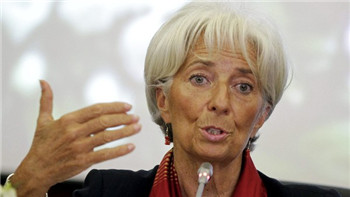
Emerging economies are facing a “new reality” that is significantly slowing the pace of economic convergence with the rich world and risks leading to further financial market volatility, the head of the International Monetary Fund has warned.
國(guó)際貨幣基金組織(IMF)總裁克里斯蒂娜拉加德(Christine Lagarde)警告說(shuō),新興經(jīng)濟(jì)體正面臨“新現(xiàn)實(shí)”,顯著拖緩了它們與富裕世界經(jīng)濟(jì)趨同的步伐,并有可能造成金融市場(chǎng)進(jìn)一步波動(dòng)。
Christine Lagarde told an audience of senior monetary policymakers in Paris yesterday that, after years of success, developing economies needed to confront profound changes now under way.
拉加德昨日在巴黎向參加聚會(huì)的高級(jí)貨幣政策制定者們發(fā)表講話時(shí)表示,發(fā)展中國(guó)家經(jīng)過(guò)多年的成功后,如今需要面對(duì)正在發(fā)生的一些深刻變化。
“Growth rates are down and cyclical and structural forces have undermined the traditional growth paradigm,” Ms Lagarde told a Banque de France conference to mark the retirement of former governor Christian Noyer.
拉加德表示:“增長(zhǎng)率下降,而且周期性和結(jié)構(gòu)性力量已經(jīng)削弱了傳統(tǒng)增長(zhǎng)模式。”此次活動(dòng)是法國(guó)央行為紀(jì)念前行長(zhǎng)克里斯蒂安努瓦耶(Christian Noyer)退休而舉辦的。
“On current forecasts, the emerging world will converge to advanced economy income levels at less than two-thirds the pace we had predicted just a decade ago. This is cause for concern.”
“根據(jù)目前的預(yù)測(cè),新興國(guó)家向先進(jìn)經(jīng)濟(jì)體收入水平趨同的速度將不到我們十年前所預(yù)測(cè)水平的三分之二。這是令人擔(dān)憂的事。”
The change would also reverberate in rich economies, she added. A 1 per cent slowdown in emerging markets will cause already-weak growth in advanced countries to slow by about 0.2 percentage points, Ms Lagarde said.
她還表示,這一變化也會(huì)對(duì)富裕經(jīng)濟(jì)體產(chǎn)生影響。拉加德表示,新興市場(chǎng)經(jīng)濟(jì)增長(zhǎng)放緩1%,將導(dǎo)致先進(jìn)國(guó)家已經(jīng)疲軟的增長(zhǎng)率放緩0.2個(gè)百分點(diǎn)左右。
Her warning comes amid growing concerns at both the fund and the World Bank over the slowdown under way in emerging economies. The World Bank last week warned that developing economies were facing a difficult year in 2016 after last year growing at their slowest rate since the 2008 global financial crisis.
拉加德提出警告時(shí),IMF和世界銀行(World Bank)都對(duì)新興經(jīng)濟(jì)體的增速放緩感到更加擔(dān)憂。世界銀行上周警告說(shuō)2016年發(fā)展中經(jīng)濟(jì)體將面臨艱難的一年,去年它們的經(jīng)濟(jì)增速是2008年全球金融危機(jī)以來(lái)最慢的。
The angst among investors over slowing growth, particularly in China, and how authorities are responding has also led to a volatile start to the year in financial markets.
投資者普遍對(duì)發(fā)展中經(jīng)濟(jì)體,尤其是中國(guó)的經(jīng)濟(jì)增速放緩,以及當(dāng)局應(yīng)對(duì)方式抱有憂慮,這種情緒引發(fā)今年金融市場(chǎng)動(dòng)蕩的開(kāi)局。
As well as urging policymakers to keep monetary policy loose and use fiscal policy and structural reforms to boost growth, Ms Lagarde called for less reliance on debt and greater use of equity financing.
拉加德敦促政策制定者維持寬松的貨幣政策,使用財(cái)政政策和結(jié)構(gòu)性改革以促進(jìn)經(jīng)濟(jì)增長(zhǎng)。她還呼吁減少對(duì)債務(wù)的依賴,更多地利用股權(quán)融資。
“There is an inherent debt bias embedded in the global tax system. More generally, the international monetary system would benefit from a higher share of equity compared with debt flows,” she said.
拉加德說(shuō):“全球稅務(wù)體系里有一種固有的對(duì)債務(wù)的偏好。但總體而言,股權(quán)資本流動(dòng)的比例若高于債務(wù)流動(dòng),國(guó)際貨幣體系將會(huì)受益。”
“This can be achieved by examining instruments that alter the composition and nature of international flows — away from short-term debt and toward longer-term equity flows.”
“這可以通過(guò)研究能夠改變國(guó)際資本流動(dòng)的構(gòu)成和性質(zhì)的工具來(lái)實(shí)現(xiàn),遠(yuǎn)離短期債務(wù),轉(zhuǎn)向較長(zhǎng)期的股權(quán)流動(dòng)。”
The IMF managing director added: “Overall, a global shift toward more long-term, equity based capital flows would alleviate concerns about reversals, and lessen the need for insurance. It would also reduce the size of financial buffers that emerging and developing countries need to maintain.”
拉加德還表示:“總的來(lái)說(shuō),如果全球范圍內(nèi)出現(xiàn)朝著更長(zhǎng)期的、基于股權(quán)的資本流動(dòng)的轉(zhuǎn)變,將減輕對(duì)趨勢(shì)逆轉(zhuǎn)的擔(dān)憂,并減少采取防范措施的需要。同時(shí)還能降低新興及發(fā)展中國(guó)家需要維持的金融緩沖規(guī)模。”
Ms Lagarde warned that the US Federal Reserve’s shift towards ending its ultra aggressive easing policies had the potential to trigger further exchange rate ructions.
拉加德警告稱,美聯(lián)儲(chǔ)(Fed)朝著結(jié)束其超激進(jìn)寬松政策的轉(zhuǎn)變有可能引發(fā)匯率進(jìn)一步波動(dòng)。
“This volatility could be induced not only by the divergence in monetary policies in major advanced economies, but also by uncertainty about their overall prospects and policy action,” she said.
她說(shuō):“可能導(dǎo)致波動(dòng)性的不止是主要發(fā)達(dá)經(jīng)濟(jì)體貨幣政策的分化,還有圍繞他們的總體前景和政策措施的不確定性。”
Commenting on the recent bout of turmoil in China, she said the shift towards slower and sustainable growth was positive “in the long run”. But the short-run impact would drag on global trade and commodity prices, as well as triggering financial turmoil.
談到中國(guó)最近一輪動(dòng)蕩時(shí),拉加德表示,向更慢的和可持續(xù)增長(zhǎng)的轉(zhuǎn)變“從長(zhǎng)遠(yuǎn)來(lái)看”是積極的。但短期來(lái)說(shuō)將拖累全球貿(mào)易和大宗商品價(jià)格,并引發(fā)金融動(dòng)蕩。
Ms Lagarde also signalled that energy prices would remain low.
拉加德還暗示能源價(jià)格仍將保持低位。











